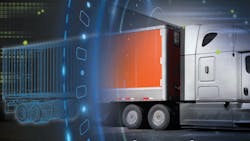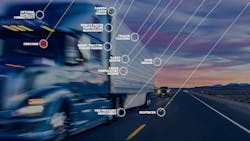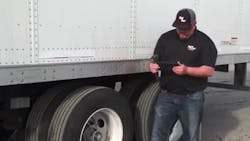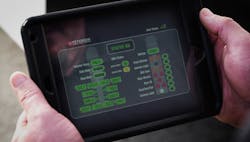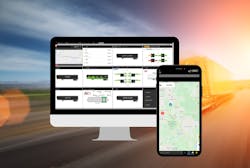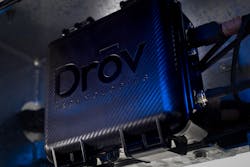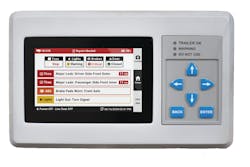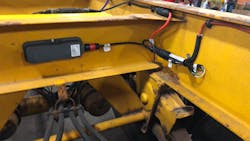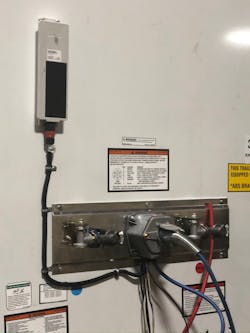Everything is getting smart these days: From smart kitchen appliances to smart doorbells and watches. Trucks and trailers are getting smarter, too. After spending most of the 20th century slowly implementing new technology, the trucking industry is leaning into the smarter, technology-rich 21st century. Trucking’s smarter future is safer, more efficient, and profitable because of its potential to make fleets smarter.
“A smart trailer is a trailer that really talks to you,” Nada Jiddou, EVP of Clarience Technologies and general manager of Road Ready, told FleetOwner. “It is a trailer that knows its current state. It knows its systems and its operation, health, and status at any given point in time. It is also able to communicate that to the fleet—or the operator—comprehensively with a complete data set.”
Just having telematics on a trailer doesn’t make it smart, Jim Epler, EVP of Phillips Connect, told FleetOwner. “The difference between a trailer and Class 8 truck is you can’t just plug an ECU into a trailer and it churns out all the faults,” he said. "A trailer has to be able to tell you its health without that.”
While a PLC reader can note some faults on a trailer, he said, a smart trailer has many other sensors that can give fleets a better view of its health.
“A smart trailer is providing you the health of the trailer to be able to proactively warn against issues that the fleet might incur while the trailer is either stationary or in motion,” Epler noted.
Chris MacDonald, SVP of global transportation at Orbcomm, pointed out that this actionable data is nothing new. Cars have had “check-engine” lights for years that tell drivers they should take their vehicle to a mechanic. But those dashboard instrument lights on cars are vague—noting a problem, not specifying it.
“In this situation, a smart trailer provides you with better visibility of how you’re running that asset,” he told FleetOwner. “It helps you maximize your utilization, keeps your trailers operational, and really helps you improve the overall efficiency of your asset.”
A standard 53-ft. dry van trailer could have 20 to 25 federally required lamps on it, according to Ross Froat, VP of engineering and government affairs for Peterson Manufacturing.
“Good maintenance programs for trailers lead to safety on the road,” Froat told FleetOwner. “It always comes back to safety because the trailer is the leading cause of CVSA violations and ‘out of services.’ So, safety amongst all that is really important in how that trailer is reacting to the braking functions, to the stopping functions, and to the awareness functions, such as lights, as it goes down the road hauling 80,000 lb., doing 70 mph.”
The future is near
Data is going to develop more rapidly over the next five to 10 years, Orbcomm’s MacDonald predicted. “Everyone is getting into the ‘smart business.’ Whether it’s fridges, TVs, or coolers, all the appliances now are ‘smart,’” he said.
“As the smart trailer expands, my belief is you’ll be able to monitor a lot more than just brakes, lights, tires, doors, weight, fuel, reefer temperature—all those things,” he added. “Camera technology is really going to grow incredibly over the next cell cycles. You’re going to see OEMs come out with cameras. We have a camera now that we can look inside the trailer to monitor percentages of bulk and monitor cargo as the trailer is going down the road. It gives you real-time visibility into what’s happening with your assets. As these types of technologies evolve and become a little cheaper, it’s going to make much more data available.”
“The future is smart. The future of supply chain is digital. It starts with smart sensing—to smart trailers, to smart tractors, and the integration of the two to generate a smarter fleet, which then creates a smart supply chain,” she added. “That future will then power autonomous driving as well.”
Jiddou said two things will drive the trucking industry to “collectively be smarter: That is electrification, which will force us to know a lot more about the state of every component we have, and autonomous, which to me will go hand-in-hand with electrification.”
In five to 10 years, fleets will be relying on 5G networks, electrified tractors, and more autonomous trucks, Jiddou added. The smart trailer is just one big part of that connected, smarter future for trucking. [See also: Older trailers face and equipment face 3G sunset.]
The future of smart trailers is “more sensors,” according to Phillips Connect’s Epler. “I don’t think tires are going away, and air systems aren’t going away.” But those systems and TPMS are going to get more advanced, he said, adding there will be a lot more embedded technology.
Startup autonomous trucking companies such as Kodiak Robotics want their tractors and trailers “to operate nearly 24/7 at peak safety,” Don Burnette, Kodiak Robotics’ co-founder and CEO, told FleetOwner in June when the company announced a partnership with Bridgestone Americas. The tire company made a minority investment in Kodiak and is integrating Bridgestone’s smart-sensing tire technologies into Kodiak’s autonomous trucking platform.
“Eight years from now, there’s going to be a lot of autonomous trailers on the road,” Epler said. He and his team at Phillips can design smart trailer harness retrofits for the trailers pulled by autonomous tractors. Both the tractor and the trailer will be packed with technology.
“You want to put cameras and sensors and ultrasonic and lidar and radar everywhere on these trailers,” he said. “We just design the harness. They install it and it plugs in, just like on your truck.”
Similar to what Kodiak and Bridgestone are designing, smart tire technologies can collect data and track whether weight is evenly distributed among truck and trailer wheels and axles, Burnette explained.
“Weight distribution plays a critical role in vehicle dynamics, controllability, maneuverability, and thus safety and vehicle performance,” he said. “Kodiak can also use data collected from the smart-sensing tire technologies to optimize autonomous driving operations to minimize wear and tear on tires.”
'Only the beginning'
“We don’t know what we don’t know about the future,” Lisa Mullen, CEO of Drōv Technologies, told FleetOwner. “Tire management is the beginning—but only the beginning.”
Because the future is promising but uncertain—and trailers can stay in use for 20 years—Mullen said that Drōv CTO Peter Jankowski might have “over-engineered the IoT board” on the AirBoxOne, Drōv's smart trailer technology platform.
Jankowski has been working on adding new features to Drōv's smart trailer system. “We just added ultrasonic sensors to the back of the trailer for backing up—just like in your car,” he told FleetOwner, “and a rear-view camera. Besides a cargo camera inside the trailer, we've also got a rear-view camera just like when you're backing up in your car, you can see behind your trailer.”
He said systems such as a rear-view camera could help fleets attract newer drivers.
“Trailers are kind of like the forgotten asset sometimes,” Jankowski said. With supply chain constraints for trailers—and other equipment—looking to extend deep into at least next year, trailers are becoming “more coveted and taken care of a little bit more,” he added.
It’s more important than ever, he noted, for fleets to know where their trailers are and how they’re being used. And to get the most out of that equipment comes with making trailers smarter because it increases preventive maintenance.
“Keeping the asset utilization is really key, but also extending the life of the trailer and making sure that’s on the road for longer periods,” Jankowski said. “You are seeing that with cars right now—people are getting cars and keeping them longer. I think the same thing will happen with trailers because those things are going up in price; they’re not going down in price. Just adding some smarts to a trailer will pay you back in spades.”
“Smart trailers will eventually need to be able to recognize everything a professional driver would recognize as a potential issue and be able to communicate that to the tractor for us to realize an autonomous future,” he told FleetOwner.
In the next five to 10 years, Garver sees “the integration and communication between truck and trailers being the major improvements moving forward. It is a must that the critical data being collected on trailer components makes its way to a driver or autonomous power unit to take corrective actions in real-time.”
Smart as standard
While many vendors are looking to provide smart trailer retrofits, the smart trailer could become standard for all manufacturers by the end of this decade, according to Bill Hicks, SAF product manager for SAF-Holland.
“This technology is on a fast track; it isn’t a fad or some short-term industry trend,” he told FleetOwner. “The ROI value proposition with the added safety benefits are simply too strong to ignore. Catching just one major trailer road event could pay for a system’s upfront emergency service, downtime, and avoid possible fines and even worse litigation costs.”
Plus, the smart trailer space is getting crowded, Orbcomm’s MacDonald noted.
“Over time, I think the OEMs are going to have to stand up and agree on a universal communication path,” MacDonald said. “And when that happens, I think you’ll see this be much more OEM-driven. Everybody is getting away from the hardware, and we’re all doing things based on a software play. A SaaS model is really where a lot of this is headed. I think you’ll see a much more significant play on the OEM side as this goes forward.”
Orbcomm, for example, is partnering with the new Hyundai SmartSense trailer system. More OEMs will offer their own IoT systems, he said. “Where they offer it to customers for free for a few months—like XM Radio when you buy a car,” he added. “Then fleets will see they can’t live without it.”
Finding that “universal communication path” that MacDonald mentioned will be critical to future trailers.
“Many of our fleets have said, 'We really want one platform, we do not want five, we don't want four, and we don't want three or two. We want one platform to be able to accept all of this data,'” Drōv's Jankowski said. “I think that’s where it’s headed—even more than just reading data—more sophisticated applications are going to come on the market.”
As autonomous freight movement becomes more sophisticated, trailer technology will need to grow with tractor technologies. “Fleets need to take the long view in terms of where they want to get to in the next five years or 10 years in terms of technology,” Drōv's Mullen said. “So the opportunity might not be that you put the fully instrumented trailer together today, but make sure you choose a company and a platform that can take you there when you’re ready.”
Mullen said she tells her fleet customers looking to retrofit equipment that maybe they should start with something basic. That could be focusing on safety or tire management, or temperature sensing. “But as you add capabilities onto your builds, you’re able to do that and still be supported under the same platform and you’re still supported by the same company.”
Peterson Manufacturing’s Froat noted that the trucking industry will see technology regulation changes that also help drive this adoption. Smart trailers, he said, complement current technology, such as electronic logging devices, and emerging technology, such as automated driving systems. A big reason is they make tractor-trailers safer—whether there is a driver in the cab today or it’s a driverless tractor in the future. For a futuristic autonomous fleet with no driver or an owner-operator that eschews automated driving systems, “smart trailer technologies can still support you in a lot of different ways.”
“Smart trailer technologies can support your mission, goals, wherever you decide, because you need that communication to know all the safety components are in operation, in status OK, for roadside [inspection] to trust your equipment to keep going,” Froat said.
Smart Basics
Smart trailers go beyond GPS tracking devices and wireless sensors monitoring cargo and door activity, according to Justin Garver, FleetPulse sales manager at Great Dane, which has been building trailers for more than a century.
The trailers become smart “by providing data and analytics that help fleets improve operational safety and profitability,” Garver told FleetOwner. “Smart trailers are connected with wired networks and equipped to collect data coming off key components on the trailers. A smart trailer provides data that can be used in real-time to predict and prevent critical component failures that can lead to unscheduled and roadside maintenance events and DOT violations.”
The goal is to get as much data from trailers as possible. But data overload can be as challenging as not having enough data, according to Jim Epler, EVP of Phillips Connect. The Phillips Connect1 system offers fleets a glimpse of all their assets on a global or individual scale. “We really focus heavily on the analytics part of all of the data to make sure that these alerts are going to be accurate,” he told FleetOwner.
Tires and air systems
“So, let's just talk about the trailer's air system,” Epler said as an example. “We're monitoring the air from the tractor, we're monitoring the air to the air tank, and we're monitoring the air to the regulator from the HS control valve to the air that inflates the tires. Then, we also have individual TPMS sensors on every tire. That’s a lot of sensors. But until you monitor that many sensors, you don’t know what’s really going on.”
Monitoring the trailer’s tire inflation system—whether the trailer is moving or stationary—can help with ROI, Epler said. Phillips’ smart trailer system monitors how much air the inflation system is using. “If it’s not putting out enough, you can easily address it—that’s been really valuable,” he said. “But the other thing that we do is we monitor the tire pressures whether the trailer is moving or sitting.”
Twice a day, the system within a stationary trailer will boot up and record a tire pressure reading, which can alert fleets to air leaks even if the tire inflation system keeps tires inflated.
“Where we're going with our business is we're not going to 100% rely on the fleets to know all of this. They're just too busy,” Epler said. “We have another team that we're putting together that will do advanced analytics of data so that we are 100% accurate in our diagnosis of what's going on with the trailer. I think you're going to need that. I think there's a lot of people that are going to be in for a rude awakening when they start measuring everything that's going on on these trailers and make it actionable.”
Brakes and lights
Ross Froat, VP of engineering and government affairs at Peterson Manufacturing, said that current smart trailers can help fleets and drivers combat the potential perils on the road. “Knowing if a light is out or if brakes are out of adjustment or pad wear is low, to how cargo is secured, can help ensure a driver keeps moving safely,” he told FleetOwner. “All these things now have sensors tied to them.”
The trailer wiring harness, like what Peterson offers, has all the technologies tied to it. “If you look at the skeleton of a trailer, the harness is the veins, going throughout the trailer and leading to the beating heart, which is the nose box controller,” Froat explained.
“They control all the sensory objects that are on there. You can tie other systems to it, such as tire inflation sensors, automatic tire inflation systems, weight-in-motion sensors, brake slack adjuster sensors, also pad wear sensors. Everything can be combined in a very good union that can all communicate through the intelligence system on the trailer. And that intelligence system can be communicated through a telematics provider on the trailer as well. So it does take other resources to make it all work together, but as long as you have a good foundation system for it to be tied in, that’s really what it comes down to.”
Cargo
Avoiding trailer and cargo theft can be a simple way to increase a fleet’s ROI with smart trailers, according to Nada Jiddou, EVP of Clarience and general manager of Road Ready. “Sometimes a trailer goes missing; sometimes the cargo on the trailer goes missing,” she said. “In any event, not only are they losing the utilization of that trailer and that asset to generate revenue, but they're also losing the insurance deductible if they have insurance on the cargo or asset.”
Just having simple location data allows fleets to generate ROI, she said. “Add to that all the other sensor capability and all the other data that you can pull off of that trailer, including how fleets can optimize their maintenance schedule and optimize their driving miles of each trailer,” Jiddou explained. “All of these generate value to that business. The smart fleet managers are capitalizing on that.”
Ready to roll
“One of the pain points for fleets is they’ll dispatch a driver to pick up a trailer without knowing if the trailer is ready,” Phillips’ Epler said. “Does it have a flat tire? Has it got dunnage in the back of it? Does it have a light out?”
The Phillips Smart7 system’s cellular radio is always on. “If you want to precheck, you can just push a button before the driver even picks it up and it checks the whole trailer,” Epler said. “I mean it’ll actually light up all the lights on the trailer without a tractor hooked to it. It'll check everything on that circuit and everything on our PCP BUS, which is the air system. It'll tell you if the door is open or closed. We have a cargo camera that will give you a clear snapshot of what's in the trailer, in addition to a cargo sensor. That will show if it’s empty or where the cargo is.”
Prechecking the trailer before the driver arrives can make for a happy driver, Epler notes. “If you can get that driver a healthy trailer where he can just connect to it and go, that’s huge,” Epler said.
Equipment shortages and uptime
A smart trailer can maximize fleet and trailer uptime, “which is vitally important during these times of equipment shortages and build delays,” Bill Hicks, SAF product manager at SAF-Holland, told FleetOwner. “By monitoring and communicating any operational issue before a trailer goes into service, the fleet manager can address any situation beforehand. This allows for controlling service costs and scheduling as well as replacement part ordering in a timely and cost-effective manner.”
With well-equipped smart trailers, it’s not just about the trailer’s condition before it leaves the yard; it’s knowing the trailer is safe as it rolls down the road, Clarience’s Jiddou said. Smart trailers should be able to warn a driver that a light just went out or a tire could potentially blow before it happens. Pulling over before an event happens can save a fleet, she said. “Roadside assistance is costly, and if you can avoid having to call roadside assistance by going to get a tire inflated or getting a light replaced at your next stop, it reduces downtime and eventually optimizes the driver experience as well.”
Smart trailer technology can also encourage some “self-policing,” Epler said. If the people loading a trailer know it has a cargo camera, “the trailer might be loaded differently,” he explained. “He actually might put the straps in that he didn’t put in before.”
Cargo shifting can lead to damaged freights and insurance claims, along with driver injuries when cargo isn’t properly secured. “We’re uncovering things like that,” Epler said. “Putting a camera in there has revealed a whole of new ROI.”
About the Author
Josh Fisher
Editor-in-Chief
Editor-in-Chief Josh Fisher has been with FleetOwner since 2017. He covers everything from modern fleet management to operational efficiency, artificial intelligence, autonomous trucking, alternative fuels and powertrains, regulations, and emerging transportation technology. Based in Maryland, he writes the Lane Shift Ahead column about the changing North American transportation landscape.
